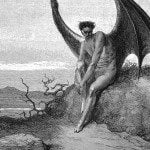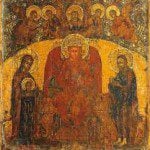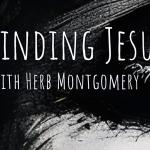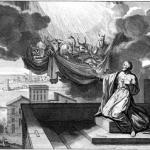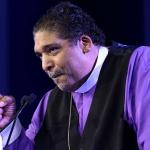Christian identification with Divine Wisdom as the Holy Spirit, though not widespread, dates to at least Theophilus of Antioch (d.183?) and Irenaeus of Lyons (125?-202?).[i]
Despite Orthodoxy’s official denunciation of Sophianism, Sophia has had a role in the Orthodox faith from early-on as evidenced by construction of a church and cathedrals to honor her – Constantinople (360 A.D., 415 A.D., and 537 A.D.), Novgorod (989 A.D.), and Kyiv (1057 A.D).[ii]
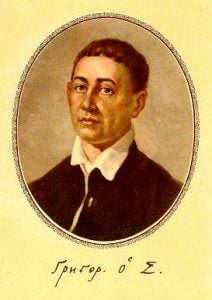
Modern Sophiology traces its roots to the eighteenth century. Ukrainian philosopher Hryhorij Savyc Skovoroda (1722-1794) may have been one of the first modern advocates of the world’s “feminine essence” within Eastern Orthodoxy.[iii]
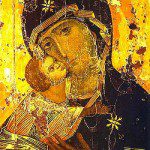
There is a maternal element here that all too often gets confused with Our Blessed Lady. Proponents of Sophiology in the Eastern Church as well as those in the West have done it. Nature, which Sophia can be associated with in light of her role as “craftsman” at the time of Creation, can be as awe-inspiring as she can be frightening. She can be as calm and still as she can be earth-shaking. She can destroy through fire and use fire to create new life. Sophia is indeed a Mother, but she is much more like Mother Nature, than she is the Mother of God who loves unconditionally. These are two distinct Mothers.
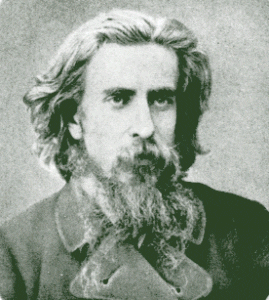
Skovoroda, a Christian who valued and promoted the ideas from the Age of Reason, may have influenced a later family descendant, Vladimir Soloviev (1853-1900). Soloviev, mystic, writer, and philosopher of Russian and Ukrainian heritage is widely attributed with the modern study of Divine Wisdom personified. He associated Sophia with the earth, God’s breath, and the one who, among other things, offers the grace of intuition and creativity.
Russian theologians Pavel Florensky (1882-1937) and especially Sergius Bulgakov (1871-1944) were significantly influenced by Soloviev and played key roles to further Sophiology.[iv] Bulgakov, highly respected for much of his body of work, wrote extensively on Divine Wisdom and received much criticism for it.
Although Roman Catholicism, like Orthodoxy, does not officially recognize such a theology or philosophy, there have been some notable exceptions among the faithful who include St. Hildegard of Bingen (1098-1179)[v], Matthias Joseph Scheeben (1835-1888)[vi], and Ukrainian Byzantine Catholic (Uniate) Metropolitan Andrey Sheptytsky (1865-1944).[vii] It is not, however, “necessary to think of Sophiology,” writes Dr. Antoine Arjakovsky, “as a doctrine belonging only to Russian, Ukrainian or even Orthodox theology.”
Dr. Arjakovsky notes Pope John Paul II in the encyclical Faith and Reason wrote the Mother of God is the throne of Wisdom. This is accurate if we think of Wisdom, in this case, as Love. But as noted earlier Sophia is not Mary. This ongoing confusion distracts from what should be the central discussion of Holy Sophia as the Holy Spirit. Dr. Arjakovsky cites other Catholics who have shown interest and been receptive to developing a Western Sophiology that include Olivier Clement, Maurice Gilbert, Tomas Spidik, and Teilhard de Chardin.[viii]
There is a long history in the East and West that has explored the nature of the Holy Spirit as Divine Wisdom. Look at the characteristics of Sophia and the Spirit and you find extraordinary similarities. These scriptural similarities frequently suggest that they are one and the same.
[i] See William G. Rusch, The Trinitarian Controversy – Sources of Early Christian Thought (Philadelphia: Fortress Press, 1980), pp. 1-7. Theophilus discusses the role of Wisdom in Apologia Ad Autolychum (Advent.org and EarlyChristianWritings.com).
See “Theophilus of Antioch and the ‘Two Hands of God’,” Theandros.com (Online Journal of Orthodox Christian Theology and Philosophy), Volume 4, Number 2, Winter 2006/2007. Irenaeus interchanges Wisdom of the Hebrew Scriptures with the Holy Spirit. He writes in Against Heresies of the “Spirit of wisdom and understanding, the Spirit of counsel and strength, the Spirit of knowledge and the fear of God came down upon the Lord . . . [God] entrusted [Jesus] to the Holy Spirit.” (Vatican.va – prepared by the Spiritual Theology Department of the Pontifical University of the Holy Cross).
[ii] Donald M. Fiene, “What is the Appearance of Divine Sophia?” Slavic Review, Vol. 48, No. 3 (Autumn 1989), p. 450.
[iii] See Richard H. Marshall, Jr. and Thomas E. Bird, eds., Hryhorij Savyc Skovoroda – An Anthology of Critical Articles (Edmonton: Canadian Institute of Ukrainian Studies Press, 1994), p. 209.
[iv] See in general Paul Valliere, Modern Russian Theology – Bukharev, Soloviev, Bulgakov (Grand Rapids: William B. Eerdmans Publishing Company, 2000).
[v] Thomas Schipflinger, Sophia-Maria A Holistic Vision of Creation (York Beach, Maine: Samuel Weiser Inc., 1998), pp. 141-.160. St. Hildegard does not make a an actual identification of Sophia, but her imagery, visions, and descriptions have often been interpreted as Sophist in nature.
[vi] Ibid., p. 390. According to Fr. Thomas Schipflinger, a Catholic priest, Scheeben “performed the immortal service of interpreting the Holy Spirit as the feminine and maternal principle of the Trinity, and provided a theological basis for such a viewpoint. His work, however, has unfortunately not been taken up. Fr. Schipflinger cites Scheeben’s Dogmatick (Freiburg: Herder, 1952), vol. II, pp. 119-120.
[vii] Andriy Chirovsky, Pray for God’s Wisdom: The Mystical Sophiology of Metropolitan Andrey Sheptysky (Ottawa: Metropolitan Andrey Sheptytsky Institute of Eastern Christian Studies, 1992) and Leo D. Lefebure, “The Wisdom of God: Sophia and Christian Theology,” The Christian Century, 19 October 1994 (AccessMyLibrary.com).
In addition, Nineteenth and early Twentieth Century interest in some level of Wisdom or Sophiology was shown by Otto Weininger, Auguste Comte, Rudolf Steiner, and Dimitrije Mictrinovic, among others. See Violet MacDermot, The Fall of Sophia – A Gnostic Text on the Redemption of Universal Consciousness (Lindisfarne Books, 2001).
[viii] Antoine Arjakovsky, “The Sophiology of Father Sergius Bulgakov and Contemporary Western Theology,” St. Vladimir’s Theological Quarterly, 49:1-2 (2005).
© Paul Peter Jesep 2011








